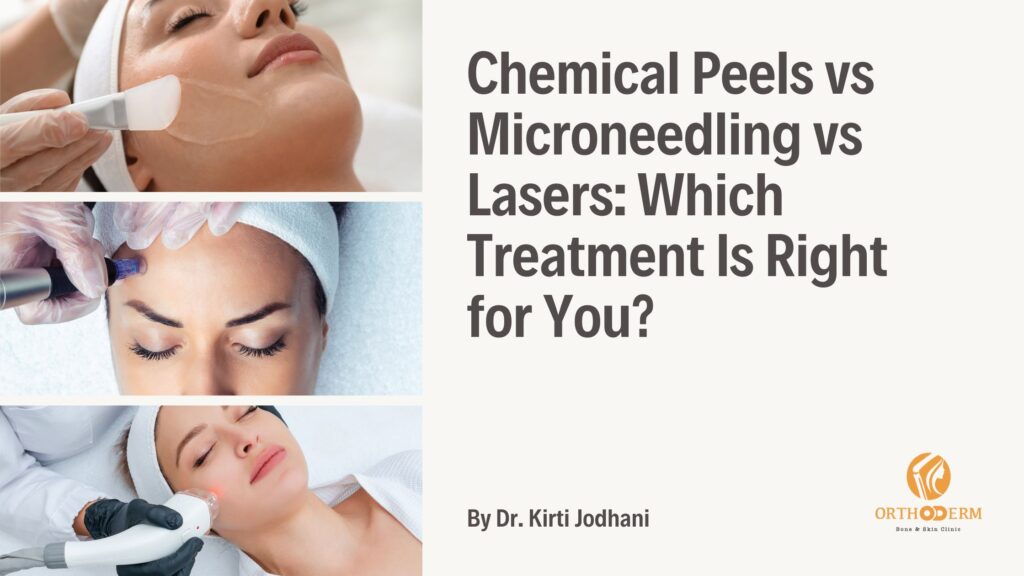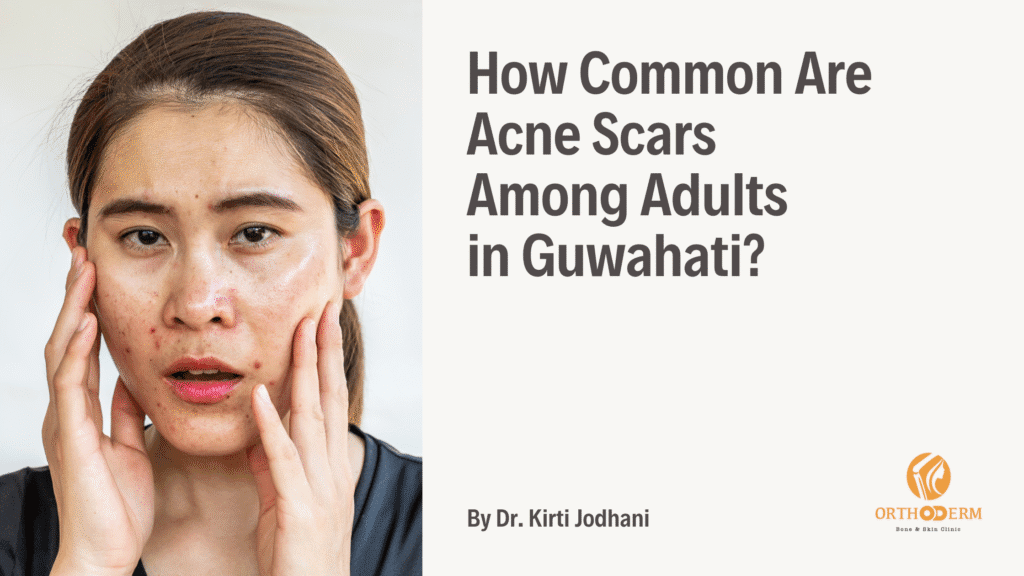As a dermatologist, one of the most common questions I hear in my clinic is:
“Doctor, what is the difference between chemical peels, microneedling, and lasers, and which one is better for me?”
If you are already familiar with these treatments, you probably want clear guidance to make an informed choice. Let me explain in detail so you can decide with confidence.
At a Glance – Quick Comparison
| Treatment | How it Works | Best For | Downtime | Safe for Darker Skin? |
| Chemical Peels | Exfoliate skin layers with acids | Pigmentation, dullness, mild acne scars | 2–5 days mild peeling | Yes, with superficial peels |
| Microneedling | Tiny needles stimulate collagen | Acne scars, fine lines, large pores | 1–2 days redness | Yes, very safe |
| Lasers | Focused light resurfaces skin | Deep scars, wrinkles, pigmentation | 3–7 days depending on type | Needs caution in darker skin |
How Each Treatment Works
Chemical Peels
I use different peeling agents like glycolic acid, salicylic acid, mandelic acid, or TCA to exfoliate the upper layers of your skin. This improves tone, reduces pigmentation, and gives a fresh glow. A 2022 review in the Journal of Clinical Aesthetic Dermatology showed chemical peels improve superficial acne scars by up to 40% after multiple sessions.
Microneedling
In this treatment, I use a device with fine needles to create micro-injuries in your skin. This triggers collagen production and gradually smoothens scars and fine lines. According to a 2021 study in Dermatologic Therapy, microneedling improved acne scars by 50–60% in patients with skin types III–V, which are common in India.
Lasers
Lasers work by delivering energy into the skin. Fractional CO₂ lasers, Er:YAG, or Nd:YAG devices resurface skin and reduce deep scars, wrinkles, and pigmentation. A 2020 study in Lasers in Surgery and Medicine reported up to 70% improvement in acne scars with fractional lasers, but it also highlighted a higher risk of post-inflammatory hyperpigmentation (PIH) in darker skin.
Condition-Based Comparison
Acne Scars:
- For mild scars, I usually recommend microneedling or a series of peels. For deeper scars, fractional lasers give better results but require careful pre- and post-care.
Pigmentation & Melasma:
- Peels with mandelic or lactic acid are safer. Lasers can worsen pigmentation if not used judiciously on Indian skin.
Wrinkles & Texture:
- Microneedling improves fine lines, while lasers are better for deeper wrinkles.
Pros and Cons You May Not Hear Often
- Chemical Peels: Affordable and quick, but repeated sessions are needed. Deep peels are rarely recommended in darker skin due to pigmentation risks.
- Microneedling: Very safe for all Indian skin types. However, results take months to show as collagen remodels gradually.
- Lasers: Offer dramatic results, but the investment is higher, and strict sun protection is essential to prevent complications.
Safety in Indian Skin
As an Indian dermatologist, I pay special attention to Fitzpatrick skin types III to V, which are more prone to PIH. I often combine treatments—for example, a superficial peel followed by microneedling—to get results while keeping your skin safe.
Common Questions I Hear
Can I combine treatments?
- Yes. For example, I may do a light peel before microneedling or alternate peels and lasers in a treatment plan.
Which is best for dark spots?
- Peels and microneedling are safer first steps. Lasers are chosen only after careful evaluation.
Is it safe in summer?
- Yes, if you follow strict sun protection and my aftercare instructions.
How to Choose What’s Right for You
Each skin is unique. If you have mild pigmentation or early aging signs, I often start with peels or microneedling. If you have deep acne scars or advanced wrinkles, I may suggest lasers with proper priming and aftercare.
My advice: book a consultation, discuss your goals and downtime availability, and we can create a tailored plan that suits your skin and lifestyle.
Conclusion:
Chemical peels, microneedling, and lasers all work beautifully when chosen wisely. I hope this guide helps you understand the differences and make an informed decision for healthier, radiant skin.
FAQ: Chemical Peels vs Microneedling vs Lasers
1. Which treatment suits Indian skin (Fitzpatrick III–V)?
- I prefer microneedling or superficial peels for Indian skin types. Deeper peels and lasers carry higher pigmentation risks and require careful priming and aftercare.
2. Can I combine treatments like peel with microneedling or laser?
- Yes—combining superficial peels with microneedling every 4–6 weeks enhances results. I may also alternate peels and lasers safely after proper skin prep.
3. What’s the typical downtime for each?
- Superficial peels: 2–5 days of mild peeling. Microneedling: 1–2 days redness. Lasers: 3–7 days, depending on severity.
4. Which is more effective for pigmentation and acne scars?
- For hyperpigmentation: superficial peels are safer. For acne scars: microneedling improves deeper scars by ~50–60%, while lasers offer up to 70% improvement but require caution.
5. What are the typical costs in India per session?
- Peels: ₹1 000–5 000. Microneedling: ₹3 000–8 000. Lasers: ₹8 000–20 000+, depending on the device used and clinic.




I must say Innovative Work!! Pretty and attractive skin seekers must surely opt for chemical peels treatment in Jaipur. Your article is a great way to convey that the process is very safe and gives excellent results when a qualified professional carries it out. Very nice and clear!